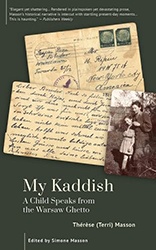As author Jerry Stahl acknowledges in this tragicomic memoir, “The subject [I’m] describing has been described elsewhere, and better, much better, a million times.” But likely nobody else describes the subject in question — the Holocaust — quite like Stahl. For instance, no other book about the Shoah includes an Auschwitz snack bar, a portmanteau of “Jew” and “vagina,” or the phrase “Adolf Hitler was a total power bottom!” Even the book’s title comes from a bawdy anecdote. Irreverent and absurd, Nein, Nein, Nein! demonstrates how an obtuse angle can help us approach incomprehensible suffering.
This is a concentration camp tour that nobody asked for but also that few would have the chutzpah to write. It reads like a standup comedy routine, replete with one-liners and non sequiturs. But its brand of comedy is not for the faint of heart. An American screenwriter and novelist, Stahl quickly cozies up with the reader, joking about his personal experiences with heroin addiction and suicide. This perspective lends a tenderness to the story: here is someone intimately acquainted with personal tragedy, exploring a behemoth one. Then comes his often outrageous humor. Whether his jokes land depends on the reader. How do you feel about a rousing rendition of “99 Bottles of Beer on the Wall” — but about Zyklon B?
This travelog also goes after the inevitable, bizarre mundanities of Holocaust tourism. There’s nothing funny about a bus tour of the concentration camps, but there’s something inherently absurd about a surly bathroom attendant at Auschwitz, or the fact that these memorials have high-tech interactive displays with sleek touchscreens. The book emphasizes what a booming industry Holocaust tourism is for non-Jewish genocide enthusiasts. Fellow travelers fill the background but blur together as generically quirky. The one other Jew on the trip besides Stahl, an older, more conservative foil, gets paid particular attention.
With all its meandering and jokes of questionable taste, Nein, Nein, Nein! reflects the unsettling, universal experience of visiting these horrific sites. How does one visit a place like this, knowing that you get to leave with your soft life intact? “My first death camp, and I feel like I’m doing it wrong,” Stahl writes. Or, “I realize the obvious: without the stench, without mud, blood, wailing, and death, this isn’t hell. This is the Museum of Hell.”
In a gnarled, crooked way, Stahl has penned a life-affirming book that reminds us to find absurdity in atrocity — because sometimes, that’s all there is.
Elana Spivack is a writer and journalist in New York City where she lives with her tuxedo cat, Stanley.





